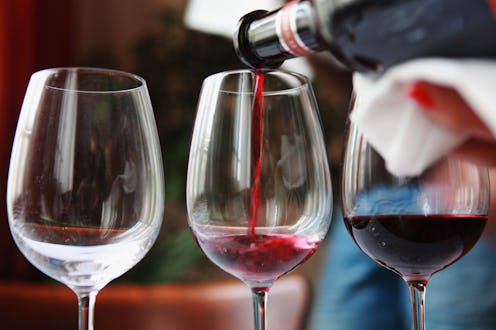There are a lot of tips and tricks out there geared towards trying to make bad wine taste better — but it turns out that one of the most effective methods doesn't involve any fancy techniques: According to a new study, we think cheap wine tastes better if we think it's expensive. We are such simple creatures sometimes, are we not?
The study, which was conducted by by Hilke Plassmann of INSEAD and Bernd Weber of the University of Bonn, sought to examine how “marketing placebo effects” function not just with regards to self-reported enjoyment, but in terms of what's going on in our brains when they're at work. Said Plassmann and Weber in a press release, “Studies have shown that people enjoy identical products such as wine or chocolate more if they have a higher price tag. However, almost no research has examined the neural and psychological processes required for such marketing placebo effects to occur.”
Plassman and Weber just published the results of their research in the Journal of Marketing Research. Utilizing an MRI scanner, they were able to examine the participants brain activity during a few carefully constructed taste tests — and the results are pretty eye-opening. Here's what they found:
The Study:
The setup was relatively simple. The participants were all told that they were about to sample five different wines, each at a different price point: $5, $10, $35, $45, and $90. While they tested out all of these wines, the researchers also used an MRI to scan the participants' brain activity. But! There was a catch: There weren't five different wines at five different price points; there were actually only three different wines at two different price points. Sneaky, no?
The Results:
“Price prejudice,” it turns out, is a real thing. The information the participants was given affected both how they rated the wine in taste and in what was going in their brains as they tasted it. Furthermore, people with some specific personality traits were more likely to to be affected by price prejudice than others: Reward-seekers and people who weren't super self-aware bought into the expensive/cheap binary more than those without those traits. Interesting, no?
There's Also This:
This phenomenon doesn't only work for wine, by the way, and it's not just about the pricing of an item. The researchers also conducted a second experiment based around milkshakes and a different type of label: Taste, rather than price. For this experiment, the participants in one group taste tested milkshakes described as organic or regular; meanwhile, those in another group were given milkshakes describes as regular or light. Why “organic” and “light?” Because the term “organic” often gets extremely positive responses, while the word “light” is usually associated with lack of flavor. The results yielded a “taste prejudice” similar to that of the price prejudice seen in the wine experiment — that is, both the participants' reported taste ratings and what the MRI showed in their brains were affected by the word used to describe their milkshake.
So… What Now?
The implications of this whole study are numerous — and I don't know about you, but I've got all sorts of questions about whether or not these sorts of price and taste prejudices pop up in other arenas, too. For example, does this experiment explain why we often pick the second least expensive wine on a wine list, rather than just going for the least expensive one? Do we think it's going to taste better? Or is it just about how we think others will perceive us for ordering the cheapest option available? For that matter, what about all those “wine hacks” that supposedly make bad wine taste better? Does whirling a cheap red around in a blender actually help, or do we just think it helps? More research please — I must know!
But in the meantime, go ahead and decant that inexpensive bottle of wine you've got lying around. Maybe it'll make it more palatable.
Images: Giphy
